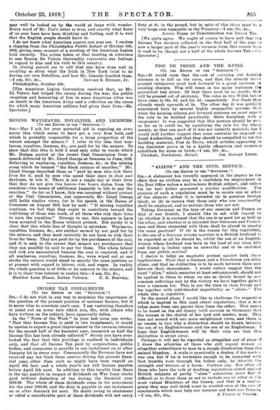" LTENS " AND THE CIVIL SERVICE..
[To THE EDITOR of THE " SPEOTATOR."3 Sus, —A statement has recently appeared in the papers to the effect that no civilian may be a candidate for employment in the Post Office unless a native-born British subject, and unless his (or her) father possessed a similar qualification. The purpose of such a regulation must be to secure one or other of two objects: either it is intended (a) to penalize foreign blood; or (b) to ensure that those only who are trustworthy shall be employed, and to exclude those who are not. Taking Germany as the type of our enemies and France as that of our friends, I should like to ask with regard to (a) whether it is assumed that the one is as good (or as bad) as the other, and whether it is intended that Germans and Frenchmen and those connected with them shall be placed in exactly the same position? If (b) is the reason for this regulation, is the son of a German woman married to a British husband ti be regarded as all he should be, whilst the son of an English. woman whose husband was born in the land of our close Ally and friend is looked upon as unworthy and to be excluded from our public service?
I desire to lodge an emphatic protest against both these implications. First that a German and a Frenchman are alike aliens, and that no distinction is to be made between them and between their descendants. 1 would rather suggest that the word "alien," which connotes at least estrangement, should not be applied to those to whom we are so closely bound by our common sufferings and by the victory we have together gained over a common foe. This is not the time to class friend an•i foe together with cold-blooded impartiality as " aliens." The whole idea is repulsive.
In the second place, I would like to challenge the suggestion which is implied in this (and other) regulations, that a man takes more from one parent than from the other. This seems to be based on the old theory (still current in Germany) that the woman is the chattel of her lord and master, man. This does not accord with our more enlightened views, and there is no reason in fact why a distinction should be drawn between the son of an Englishwoman and the eon of an Englishman. I hope that Englishwomen will by their vote see that this distinction is swept away.
Perhaps it will not be regarded as altogether out of place if I draw the attention of those who still regard woman as altogether subordinate to man to a simple illustration from the animal kingdom. A mole is practically a donkey if his moth sr was one, but if he is fortunate enough to be connected with that humble race through his father only, he inherits the strength and stature of a horse. Verbum sap. But after all those who have the task of drafting regulations aimed against British subjects of partly "alien" extraction must find it difficult so to draw them as not to include one or other of I hs most valued Ministers of the Crown, and that is a contingency they may well think must be avoided even at the cost of enactments which mar help our enemies and hurt our friends.
—I am, Sir, &c., A FRIEND OF FRANCE.










































 Previous page
Previous page